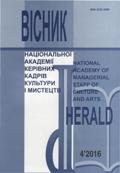INTERCULTURAL DIALOGUE AND BELARUS: CRISIS OR CHANCE?
INTERCULTURAL DIALOGUE AND BELARUS: CRISIS OR CHANCE?
Author(s): Liubou Uladykouskaja, Susan de FranceSubject(s): Anthropology, Ethics / Practical Philosophy, Political Sciences, Communication studies, Sociology
Published by: Національна академія керівних кадрів культури і мистецтв
Keywords: Intercultural dialogue; European cultural policy; Belarus; nation building
Summary/Abstract: The goal is to define the functional role of intercultural dialogue in modern Belarus. The research methodology is based on the next methods: system analysis, structural-functional, historical, anthropological, and axiological, which allow us to consider the national culture and the contemporary socio-cultural space in their integrity and consistency. Philosophical methods (analytical, phenomenological and dialectical) made it possible to identify the tendencies of development and interpretation of intercultural dialogue. Deduction and induction, abstraction and generalization were also used. Scientific novelty. This article is devoted to the modern interpretation of the intercultural dialogue and its functional role in Belarus. Conclusions. Being a universal value of the modern world and strategy of European cultural policy intercultural dialogue plays a critical role for the nation building and democratic transformation in Belarus. The crisis of the Belarusian national culture, the lack of natural linguistic and cultural context, not high enough level of national identity and the split of the Belarusian society can be overcome to a large extent through the development of intercultural dialogue, which would be an attributive characteristic of Belarusian society due to its historically multi-confessional and multi-ethnic structure and deep democratic traditions of the Belarusian history.
Journal: Вісник Національної академії керівних кадрів культури і мистецтв
- Issue Year: 2016
- Issue No: 4
- Page Range: 20-23
- Page Count: 4
- Language: English

